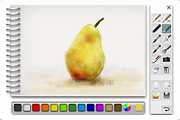Internet Explorer 7 has been out for a year now, and in the IE Blog we have been able to read about the work they’ve done with it and related issues (Active-X, silverlight, …). The last entry in November told us about how IE7 is doing, security wise, support calls, and a bit more. But while IE7 was a nice step up from IE6, it’s still lacking in standards compatibility, so what many wants to know is what’s going on with the next version of the browser. After all, we were promised that we shouldn’ have to wait so long between updates now.
Well, Wednesday the 5th of December is a day to remember. In the blog they proudly presented the following: The next version of Internet Explorer will be called — wait for it — Internet Explorer 8. And, that’s really it.
Wow!
We were told that we shouldn’t mistake the silence with inaction, but what’s actually being done they don’t reveal. We will laer, we’re promised, but… So far, Molly Holzschlag gives us more information in an article about some questions she asked Bill Gates about the browser and information given, and in the comments we also learn from her that IE8 will have a new rendering engine. She would like to tell us more, but can’t because of her NDA — but reveal that what she’s heard so far is to her liking. As she’s very concerned with standards, that sounds a bit promising, but so far all we can do is wait and speculate.
What exactly is the NDA about? It can’t be that they’re implementing even more support for standards, can it? So we’ll have to assume there are new features. She also wrote it’s going to be a new engine, so the old one must’ve been scrapped. As we know from the Opera development blog sometimes the old engine have to be scrapped and a new being written, to be able to support the new stuff properly. Or at all. So we can hope for some real good changes, then.
Apropos Opera — fun how to see the difference between what we’re told about that browser and IE. It’s perfectly OK that we’re not told everything, but… From Opera ASA we’re told openly about Opera 9.5 and what they implement, we even get to try the latest builds each week. We’ve even been told a little about Opera 10, that it will use yet another rendering engine, why, and what we can expect from it. And from Microsoft, so far we’ve learned that the next browser will increment the version number by one…

 If you use Opera, you may use many of its features on a daily basis. If you research stuff, you may use the built in notebook to jot down information you find (or copy it directly from the pages), or maybe write down ideas for some creative writing. But if you’re an artist and get ideas for drawings or paintings while you’re browsing, what do you do? Put the computer aside and find a sketchbook? Fire up Photoshop? Well – here comes widgets to the rescue!
If you use Opera, you may use many of its features on a daily basis. If you research stuff, you may use the built in notebook to jot down information you find (or copy it directly from the pages), or maybe write down ideas for some creative writing. But if you’re an artist and get ideas for drawings or paintings while you’re browsing, what do you do? Put the computer aside and find a sketchbook? Fire up Photoshop? Well – here comes widgets to the rescue! I see from my server logs that many visitors come here after searching for Opera 9 and bittorrent. It could mean that bittorrent is a popular feature in Opera — had it not been for an additional word in many of the searches: Disable. While some want to know more about how bittorrent is used, quite a few (of my visitors) want to know how to disable the feature. Quick answer: Type opera:config in the address bar, find the bittorrent section, uncheck enable.
I see from my server logs that many visitors come here after searching for Opera 9 and bittorrent. It could mean that bittorrent is a popular feature in Opera — had it not been for an additional word in many of the searches: Disable. While some want to know more about how bittorrent is used, quite a few (of my visitors) want to know how to disable the feature. Quick answer: Type opera:config in the address bar, find the bittorrent section, uncheck enable. Opera is a versatile browser – it has lots of features, nicely collected in one package, and many of us don’t know how we can get by without it. Now, from time to time I read some opinions, that the Opera browser are for technical people only, not for “common people”. This is of course pure hogwash.
Opera is a versatile browser – it has lots of features, nicely collected in one package, and many of us don’t know how we can get by without it. Now, from time to time I read some opinions, that the Opera browser are for technical people only, not for “common people”. This is of course pure hogwash.